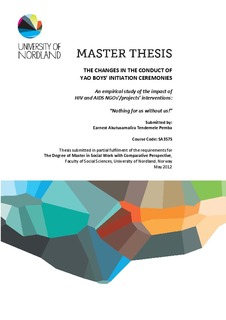| dc.description.abstract | My study investigates how involvement of key community leaders and facilitators as part of service users affected success of the HIV and AIDS NGOs’/projects interventions on the conduct of Yao boys’ initiation. My study provides an understanding of how crucial involvement of key community leaders and facilitators is for NGOs interventions success. This NGOs involvement was traced from the conception of the interventions. This is by looking at who was involved in making of the choices of program activities and also during interventions implementation and what has been the success, the challenges faced, and the resulting overall perceptions of the intended beneficiaries. My study discusses also the future of Yao boys’ initiation and the study respondents’ thoughts on a policy on the conduct of Yao boys’ initiation and recommendations for future NGO interventions approach.
My study draws on four different but related theories in addition to previous related studies to understand more the interventions of HIV and AIDS NGOs’/ projects in the conduct of Yao boys’ initiation ceremonies. These are empowerment theory-problem solving and the strength perspective; individual and social change/ change from below theory; community participation/involvement concept- participatory development approach; and dependency theory. My study has used qualitative, participatory research methods in data collection and analysis. Data in my study is from key informant interviews with three NGOs working in HIV and AIDS interventions; in-depth interviews with key Yao leadership; focus group interviews with Yao initiation beneficiaries and direct participant observation of 2009 Yao boys initiation. Previous studies and articles related to my topic have been reviewed and helped in analysis and discussion in my study.
My study findings reveal that most NGOs in the HIV and AIDS interventions do not actively involve the key community leaders and facilitators in their interventions on the conduct of Yao boys’ initiations. This has affected their performance in changing the conduct of Yao boys’ initiations. The lack or limited involvement of community leaders and facilitators can be attributed to the mission and visions of the NGOs which can still be traced from the orientation of the NGO that is the fact of either being religious affiliated, local or international. There is a chain of causality. Donor dependency for funding has also affected the NGOs ability to genuinely involve their beneficiaries. Among other factors, involvement of key beneficiaries in NGOs interventions has demonstrated to be a critical factor that it is necessary for NGOs to succeed with their interventions. The NGO in my study that attempted to involve community leaders and facilitators not only had higher success than the others in modifying the conduct of Yao boys’ initiation, but was also welcomed and happily associated with by its intended beneficiaries, the Yao people. While my study found that the Yao people feel sidelined by most NGOs interventions and feared for the worst of their traditional initiation ceremonies, there is hope if the NGOs interventions involved the key community leaders and facilitators. This would ensure that their interventions are not only in line with the needs and aspirations of their intended beneficiaries but would also improve the chances of acceptance, participation, ownership and sustainability of such interventions.
My study suggests that there is need to preserve the conduct of Yao boys’ initiations and need for more NGOs HIV and AIDS interventions on the conduct of not only of Yao boys’ initiation but all traditional initiations in Malawi. For the interventions to succeed, they should involve the local leadership influential in the conduct of the particular initiation ceremonies at all stages of interventions implementation. There is need for more collaboration, cordination and networking among NGOs implementing HIV and AIDS interventions. There is also need for the development and enforcement of a policy to guide the conduct of traditional initiation ceremonies. This would help to regulate, monitor and would guide in making conduct of initiations not a threat to other social issues and life. | no_NO |
